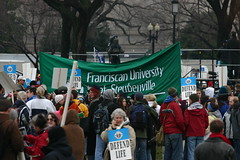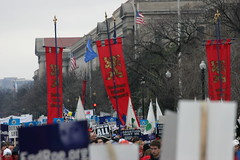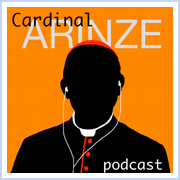Personal Love of God
"And we know that the Son of God is come: And has given us understanding, that we may know the true God, and may be in His true Son. This is the true God, and life eternal. Little children, keep yourselves from idols." St John 5:20,21.
No one can look, dear brother and sisters, into the history of the struggle between the Christian Church and its opponents of past and present times without being struck by the great distinctive feature that marks off that struggle from all others, whether of philosophies, or politics, or races. It is a difference of intensity both in the opposition and in the support which have, in all ages, been given to the Christian idea.
We see this in the generally recognized fact, that no party spirit can run so high that it will not run ten times higher when what is called the religious element is introduced; and the odium theologicum is the great bugbear of those who think that the cold, unimpassioned tone of modern argument, is a note of its truth.
Christianity is, then, more than a philosophy, more than a policy: and while philosophers and politicians wonder why it is so, God in His mercy has shown us Christians the reason. We know that what is our pride and our joy, what is in sorrow our support, in bereavement our surviving friend; what we cling to in life and in death; what we suffer for, and what makes that suffering light; what we are prepared to die for, and what would make our martyrdom easy, is no trust in a theory, no admiration of a fancy, but is something deeper, something holier far: is a love, a tender love; a faith, a loyalty, a devotion, the yielding of our being to One who is in our midst a Personal God, with a threefold beauty of Father, Son, and Holy Spirit.
Here is the secret of Christian valor and Christian success; and here, also, is the explanation of anti-Christian animosity towards the Personal God, whom with a triple sin the world rejects as Creator, Redeemer, and Sanctifier. Christianity had scarcely dawned, Jesus was as yet but a helpless infant, when that great rejection was foretold by Simeon, when he said to Mary His Mother, "Behold this Child is set for the fall and for the resurrection of many in Israel, and for a sign which shall be contradicted."
And that prophecy of contradiction entered into Mary's heart, and found there the strongest love that mother ever bore to son, that creature ever bore to Creator; beginning in that first crushing dolor of our Blessed Lady, the struggle between the love of God and the hatred of God, which can only cease on earth when Christianity passes into a fuller and eternal dispensation.
This, then, is the fundamental truth I would have you reflect on today. That our God is a Personal God, that our religion is summed up in personal love of Him, and that the attacks of the enemies of Christianity have been at all times, and are now, mainly directed against this dogma, as against the embodiment of the Christian Idea.
The Incarnation - that is, the taking of our human nature by a Divine Person - being the central truth of Christianity, and the great realization of the Personality of God, has ever been the object of the enemy's assaults. It is Jesus Christ who is the sign set up to be contradicted; and the principal heresies of the early ages of the Church were aimed at Him and His Divine Person.
While the Arians' denied that He was God at all, the Nestorians said He was a human person as well as a Divine one; and the Eutychian and Monothelite heresies, in robbing the Divine Person of His human nature and will, sought to divorce Him from that close union which made Him Emmanuel - God with us.
But these false doctrines passed away with those that held them, and then came the great blight of Protestantism. Men were no longer to be so intimate with their God. Expression of personal love, whether in the privacy of devotion or in the splendour of the Church's ritual, all Catholic loyalty and Christian chivalry were things of superstition. They would have a purer, albeit a colder creed. It was an estrangement, it was "following afar off;" and perhaps they thought no more than Peter that it would end in a denial. "You search the Scriptures, for you think in them to have eternal life. . . And you will not come to me that you may have life."
It has been left to our days to see the outcome of Protestantism. Our good God has made in these times a special revelation of Himself. The Father has opened to His children the books of science, and taught them the wonders of His creative love. They read the story of the earth and of the rock; they turn from it to the beauties of the vegetable and animal kingdoms; they study the delicate structure of man's organization, and analyse the complex workings of his brain: everywhere they see the ordination of aim to end, the shaping of matter by idea, the strange existence of a world-wide type; the mind of their Heavenly Father working, His will directing; the close clinging Presence of Him in all creation: they see all nature flooded with His beauty, they look into His face, and do not recognize Him. And why? Because in their hearts they find nothing to correspond with what is shown to them.
The God of their religion had come to be a mere notion, a logical conclusion, an idea of the intellect; but here are facts, soul-stirring facts - movement, life, beauty, a Presence instinct with power that awes them, and wisdom that attracts them. Oh, no! this is not their God; these things are not notions! And so they deify the creature, and our good and loving Father is put out from His own creation. He is the "Unknowable," the "Unthinkable," and so, alas, the "Unlovable."
And as we hear these words, time seems to have turned back to the day when St. Paul stood in the Areopagus - as we might fancy him at a Scientific Convention or Congress now and cried out: "You men of Athens, I perceive that in all things you are too superstitious. For passing by and seeing your idols, I found an altar also on which was written: To the unknown God. What, therefore, you worship, without knowing it, that I preach to you."
What St. Paul preached then, my brothers and sisters, God has called us to preach now, and the errors of the Athenian Areopagus are the errors of our own days. We must still preach the Father, Son, and Holy Spirit, the One Personal God; we must still preach the sign of contradiction, and rally Christians round the person of their Christ.
To the throngs of men full of new notions, to the holders of new and strange philosophies, to the leaders of young sciences, and the rulers of young nations, the Christian tells the self-same word that was heard in the streets of Jerusalem, and by the listeners of Rome and Antioch: love for One whose love is never weary; a single heart, a single aim, devotion to a Personal God, loyalty to Jesus, love of His Sacred Heart. And His was the same word, when through Judea, Samaria, and Galilee, He preached the love of the Father, the promise of the Paraclete, and by His personal presence led men to leave all things and follow Him.
Let us hear some of His words as told in one of the Gospels - that one on which the volleys of modern criticism are directed, perhaps because it is, of all others, the Gospel of love, and written by the disciple whom Jesus loved.
In Our Lord's first discourse, as related by St. John, we read: "For God so loved the world, as to give His only-begotten Son; that whosoever believes in Him may have everlasting life."
And in the last discourse of Jesus before His Passion, we read: "If you love me keep my commandments. And I will ask the Father, and He shall give you another Paraclete, that He may abide with you for ever."
And a few verses further on we read: "If any man love me, he will keep my word, and my Father will love him, and we will come to him, and make our abode with him. . . . The Paraclete, the Holy Spirit, whom the Father will send in My name, He will teach you all things."
And again, in the whole fifteenth chapter, Jesus tells His disciples of the love of tho Father, of the Paraclete, of Jesus Himself, often repeating Himself in His desire to enforce this doctrine of love. And in that touching prayer to His Father, which forms the seventeenth chapter of St. John's Gospel, and in which the whole previous discourse is summed up in one final appeal, Jesus concludes in these words: "Just Father, the world hath not known Thee: but I have known Thee: and these have known that Thou hast sent me. And I have made known Thy Name to them, and I will make it known; that the love wherewith Thou hast loved me, may be in them, and I in them."
And here the preaching of love by word ceased, and the preaching by deed began; for in the very next verse we read: "When Jesus had said these things, He went forth with His disciples over the brook Cedron, where there was a garden." He was about to prove that love of His "greater than which no man has, that he lay down his life for his friend."
And this Christianity, preached as the law of Love, by a Divine Person, founded in the sufferings and death of the God-man, Jesus, was spread by the very same preaching of love, and sealed by the blood of innumerable martyrs, who gave their lives for their Friend. And He was ever, by these heroes of His love, giving them that strength and peace of heart amid their sufferings which has been through all times the puzzle of the persecutors of Christianity.
How touchingly is the Personal aid of Christ to His first martyr, St. Stephen, told us in the Acts: "But Stephen being full of the Holy Ghost, looking up steadfastly to Heaven, saw the glory of God, and Jesus standing on the right hand of God. And He said: Behold I see the heavens opened, and the Son of Man standing on the right hand of God. . . . And they stoned Stephen, invoking, and saying: Lord Jesus, receive my spirit."
And we all remember the story of the grand old St. Polycarp, who, when commanded by his persecutors to forswear Christ, answered: "Eighty and six years have I been His servant, and He has never wronged me, but ever has preserved me; and how can I blaspheme my King and my Saviour?"
Jesus is with His martyrs now, as He was then, and thank God that there are souls as true, and lovers as valiant, as ever faced the terrors of the Amphitheatres of Rome. I quote from a letter from a Catholic Bishop in the southeast of Asia. He writes:
"Fifty-seven Christians had been made prisoners. Before putting them to death, the pagans thus addressed them: 'Let those who wish to save their lives rise up,' to testify that they apostatize. One man and four women rose up, and were at once released. The other fifty-two, who continued praying, were brought to the riverbank to be drowned. They were tied together, hands and feet, and cast into the stream. A Christian woman, mother of four little children, told me of her husband's martyrdom. His executioners, angry at his perseverance in prayer, even after he had received the first sabre cut, threw him on his back and cut off his head. He had four companions in his martyrdom - two men, with their young wives, all recently baptized; they all died joyfully."God will probably not call us to be martyrs, my brothers and sisters, although now days one cannot see what is ahead. But however this may be, we shall have enough to suffer from the enemies of Christ, fight enough to make for Him. The prison and gibbet are perhaps easier to bear than what we may have to take from the world, and to resist in it. Its sarcasms, its railleries, its brilliant show of logic, all that charms in scientific research, in the speciousness of half truths, and in the elegance of refined thought and language - to all this we must oppose the simplicity of our personal love for our God, the faithfulness of our devotion to our King, and the fearless chivalry that is the outcome of that devotion.
And in this, the mode of our opposition to the world of modern days, we do but follow the example of our Mother the Church. See her last two definitions. One was an act of personal homage to the Mother of Jesus, the other was a fearless declaration to an angry world, that he who sits on the Chair of Peter is in his prerogative of Personal Infallibility, the living representative among men of that Divine Person, whose mystical body is the Catholic Church. Thus our love for the Pope is but an expression, and a natural one, of our love for Jesus Christ.
The modern devotions of the Church have followed her dogmatic definitions; and the rapid spread of her rite of Benediction of the most Blessed Sacrament, of the cultus of the Sacred Heart, and of the beautiful devotion to the Holy Spirit, has brought home to men's hearts the full meaning, the full strength, and the great practical bearing of the dogma of the Personality of God.
Our duty then, is plain. That we cannot love what we do not know is an axiom of philosophy. But in the knowledge and love of God, it is also true that we cannot know Him and not love Him.
Let this then be our strength! Let us learn to rest dissatisfied until our knowledge turns to love, and our study to prayer, and our actions to charity.
And we may be assured of this, that if we enter into the presence of the Father, Son, and Holy Spirit, by frequent adoration of each Divine Person, by quiet meditation on our relations with each, and by that spirit of unworldliness which will make us clean of heart, and thus fitted to see God, then we shall be drawn by the beauty of that Presence, strengthened by its nearness, taught by its wisdom, looking forward to the day when the veil shall be rolled back, and we shall see, no longer in enigma, dimly, but face to face, and heart to heart, the glory of the Father, of the Son, and Holy Spirit, as it was in the beginning, is now, and ever shall be, world without end. Amen!
_________________
Adapted from...Sermons 1877-1887
by Fr Arthur Ryan
President of St. Patrick's College
Thurles, Ireland
St. Patrick's College, in 1992, ceased to be a Seminary.















